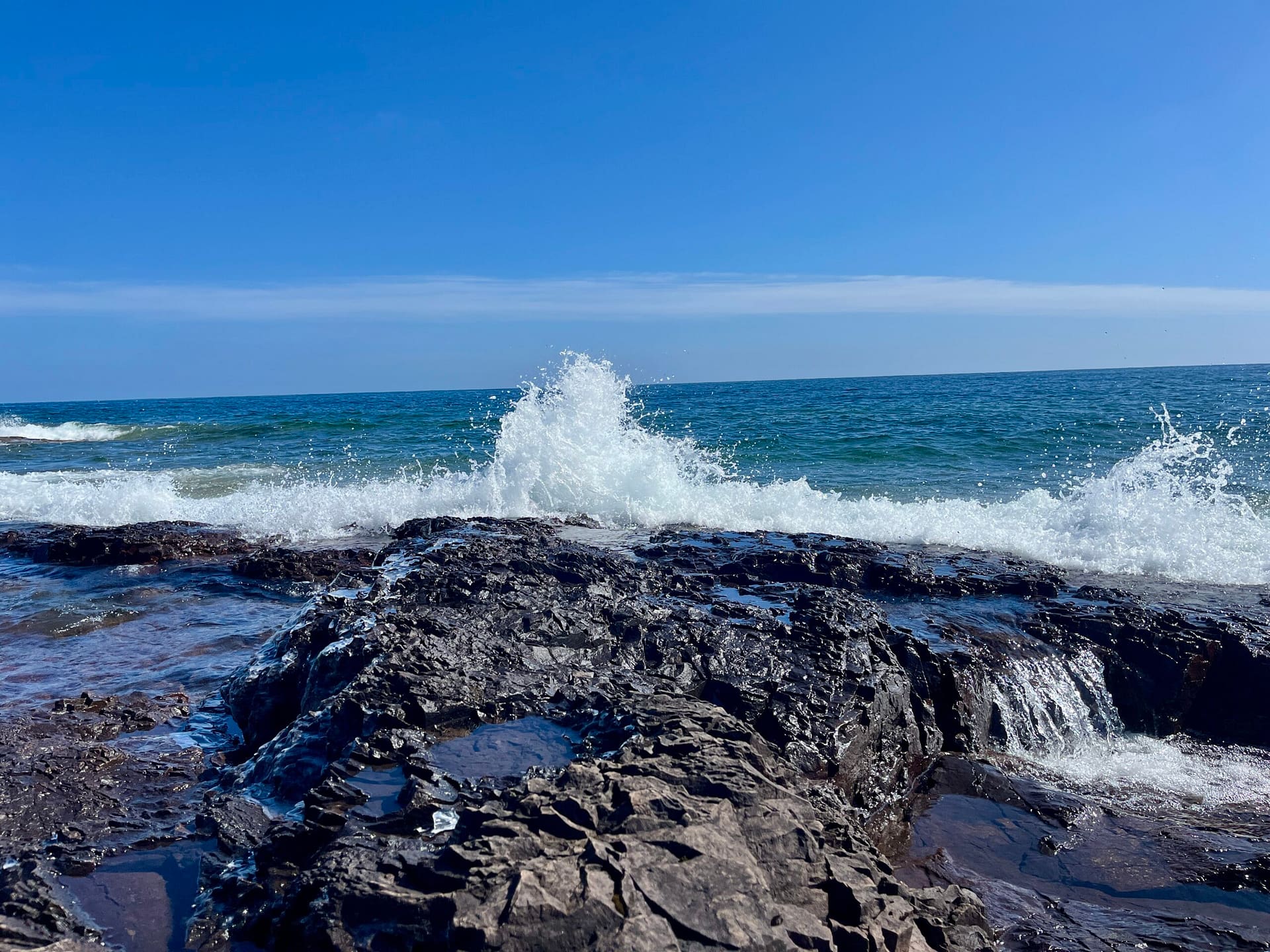Can nature calm you down? As an eco-therapy guide, I’ve spent many hours leading others on therapeutic walks in the woods. The feedback I’ve gotten is that nature had a calming effect and the people with me felt a deeper sense of peace. As a nature enthusiast, I’ve spent countless hours enjoying nature. I, too, have benefited greatly from nature’s calming effect. The more time I spend with nature, the deeper my connection. The sense of calm it provides stays with me, even indoors.
So yes, nature can absolutely, without a doubt calm you down—science has proven it! Eco-therapy has become a big industry and the great news is you can do it yourself, without a guide! Discovering nature’s calming effect for yourself is better than reading a scientific paper, so get outside and find out how nature can calm you down. The following are some suggestions.
Ditch Your Phone
What … huh?
I’m sure at least some of you were alarmed by the suggestion of ditching your phone. I get it. Many people are more connected to technology than nature. No shame, no judgment here. But let’s be honest, we don’t often allow ourselves to be out of reach of our techy tools.
If possible, leave your phone, or any other technology, behind. Disconnecting from time-to-time is healthy. Dare I say needful? In a digital world we often neglect our need for the natural environment. When you’re outside for a refreshing and therapeutic walk, unplug and open yourself to the calming effect of nature.
Seek Out a Quiet Place
Go to a park, near a body of water, or into a wooded area. Even your own yard will do. If you live in a city and can’t find a quiet place, you can still benefit from nature. Cities offer parks, boulevards lined with trees, and other green spaces. City noise is an issue for me. I live in a large metropolitan area. While I often drive to find larger, more remote natural areas, I also seek nature in the city and suburbs. I have learned to tune my ears to nature and ignore human-made noises.
If you find a place of quiet, allow yourself to sink into the silence. The hush of nature has many benefits, including reducing stress, boosting mood, and forming a deeper connection with the natural world.
If you find yourself uncomfortable with quiet, start small. Spend as much time as you can but stop before you begin to feel anxious. At times, we can be uncomfortable with silence, but it is a worthwhile thing to pursue. Practice being quiet in nature regularly, and you will likely grow to love it over time.
Breathe Slowly and Deeply
Breathing slowly and deeply is beneficial in many ways. It increases relaxation as well as alertness. Oxymoron, I know, but science has proven it. In today’s world, there is a lot of information about breathwork and its benefits. I’ve studied it, worked in the field, and practiced it myself. I can personally attest to the benefits of mindful breathing.
Science has shown breathwork decreases anxiety and anger. Have you ever been told to breathe and count to ten when you’ve been irked about something? It is because the breathing helps calm the nervous system. In fact, take a step further and breathe through your nose. Not to get all sciency on you, but nitric oxide is produced in your sinuses when you breathe through your nose. This handy chemical relaxes and dilates the blood vessels, resulting in better blood flow and lower blood pressure.
You need not practice breathing this way for your entire outing, just try it for several breaths as you walk outside. Then, resume normal breathing. If you are able, inhale through the nose, pause at the top of your breath and exhale slowly. Pause at the bottom of your breath and repeat.
Walk Slowly
Slowing down isn’t something humans are always good at. I’ve had my crazy-busy seasons in life. I wish I had known then what I know now about the benefits of slowing down. I might have prevented some unnecessary stress from my life. Especially at certain stages of life, we get busy and forget to shift into a lower gear.

When you are outside, slow your movement and allow yourself to be unhurried. Let it be a gift you give yourself and stop on occasion to do some nature observations.
Notice Your Surroundings
There is so much to see outside! Noticing your surroundings isn’t always a natural thing to do. I’ve made it a practice to intentionally notice small things in nature—a spider’s web, an ant, or the designs on a leaf. There are many big things to notice and endless small things.
Did you know noticing nature can improve concentration and creativity? Amazing, I know. It is such a small effort for a great reward. I don’t know if you’re like me, but sometimes I spend so much time working (indoors), concentrating and creating, that my brain starts to tire. What a positive thing to engage in, noticing your surroundings in nature to effect creativity.
Engage Your Senses
Use your senses to experience nature. Doing so will boost mental clarity and reduce stress, fostering a sense of calm. Opening yourself to nature by engaging your senses will deepen your experience.

Sight: Seeing foliage and water, observing critter behavior and feasting your eye on the natural environment promotes satisfaction and happiness. Hey, get your happy on naturally! How easy is that?
While this post is primarily about getting outside, I’d like to add looking out a window at nature. It has healing benefits—boosting self-esteem and reducing depression. Yes, please!
Today I was driving just prior to sunrise and I enjoyed nature through my car windshield. There were low-hanging clouds in the colors of pink, orange, and purple. I tried to keep my eyes on the road, but honestly, the clouds were spectacular. (I should’ve pulled over to enjoy them longer!) It took me a few minutes of driving to realize I had a smile on my face. Nobody was in the car with me to crack a joke, the radio was off, so no snarky morning announcers, just me and my cloud-induced happiness.
Smell: Our sense of smell is a powerful influencer on emotions. Certain natural smells produce happiness (summer air), and others produce calm (plants and flowers). Of course, there will always be unpleasant smells, but those can be avoided. Unless, of course, you enjoy stinky things.
Here’s an unpleasant smell I like: the smell of fish. And I’m not talking about fresh fish, which has a clean smell (usually). I’m talking about that pungent smell of old (and out of the water) fish. I often smell it when near a river. While unpleasant odors can evoke negative emotions, this isn’t the case for me and the near-the-water-fishy-smell. To each their own nose, right?
Hearing: Natural sounds are known to reduce stress, improve your mood, and even lessen pain. Listening to ocean waves can give you focus, bird songs can spark joy, and a variety of sounds in nature can provide a deep sense of connection.
Sometimes, city noise is loud, and nature is hushed. I encourage you to experiment here. If you find a spot in the natural environment and focus on sounds (birds are everywhere), see if you can heighten your sense of hearing, listening for nature noises, and ignore human-made sounds. I’ve done it many times. I’m still learning, but ignoring cars and crowd noises is becoming second nature for me.
Taste: I use this sense with caution. When I’m in the woods, I know a few things I can eat, but I’m not super adventuresome here. I’m certainly not educated enough to sample mushrooms (so many are poisonous) or unknown berries (again with the poison). So be cautious of your taste sense. Proceed at your own risk!
Touch: Again, proceed with caution. There are many things outside that can be safely touched. Tree bark, ground cover, and various grasses. But there are also poisonous things, like ivy and oak. So, engage this sense when you know what you are touching.
Be in Awe
Fostering a sense of awe where nature is concerned is super healthy. Yes, I said super because a sense of awe—wonder—in nature has a bunch of benefits, including stress reduction, calm, happiness … need I say more?
I read awe can calm the nervous system and release the “love” hormone, oxytocin. Yep, get outside and be in awe. You’ll fall in love with the feeling!
Find Your Calm in the Wild
It isn’t news that nature can calm you down. The benefits are tremendous. Happiness. Creativity. Connection. Less stress. Better concentration. Reduced anxiety. The list is long!
Get outside. Find a place to engage and forge a deeper connection with the natural world. You might find yourself finding your calm in the wild!


